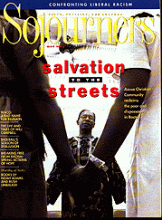Life has not been easy for Will D. Campbell. Born in a yeoman farmer's family in rural Mississippi some 68 years ago, Campbell has battled poverty, the Great Depression, bigotry, and the dehumanizing forces of bureaucracy. This author of 10 books is a Baptist preacher who lives on a 40-acre farm near Nashville, Tennessee with Brenda Campbell, his wife of 46 years. His friends know him as the model for Preacher Will B. Dunn of the Kudzu comic strip.
Campbell is a many-faceted person: scholar, activist, writer, preacher, disturber of the status quo, peacemaker and reconciler, champion of the underdog, humorist, country music singer, husband, father, and speaker to various student groups and church organizations. The list could go on and on.
Author Campbell's first book was Race and the Renewal of the Church (1962). For someone who circulated in liberal circles, it was a radical piece of writing (radical in the sense of going to the root of an issue, not in being reactionary). The book's main thrust was the miserable failure of formal religious organizations in the civil rights crisis.
Campbell has never talked much about his involvement in the civil rights and anti-war movements, but he was in the middle of both. He was the only white person present at the organizing of the Southern Christian Leadership Conference. He walked with children to integrate the schools in Little Rock, Arkansas.
However, Campbell wonders if it would have been better if the Supreme Court had not ruled for the end of segregation in public education in 1954. Individual Christians would thus have been left to resolve the struggle with their consciences themselves. Then they would be forced to declare, "Thus saith the Lord ..." instead of "The law of the land says ..."
Read the Full Article

